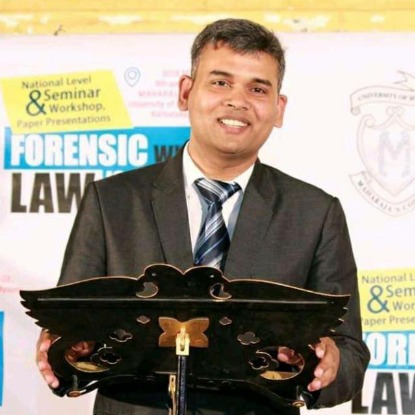
The Science of Justice: Exploring Careers in Forensic Investigation
As someone deeply committed to advancing forensic science education, I was thrilled to deliver a lecture at Amity University Punjab titled “The Science of Justice: Careers in Forensic Investigation.” This topic is close to my heart because forensic science plays an indispensable role in our justice system, blending scientific rigor with investigative precision.
In this session, I aimed to shed light on the fascinating career opportunities in forensic science, highlighting the interdisciplinary nature of the field and its critical impact on solving crimes and delivering justice.
The Intersection of Science and Justice
Forensic science is the perfect marriage of science and justice. It provides the evidence needed to uncover the truth, often serving as the decisive factor in criminal investigations. The tools, techniques, and methodologies employed by forensic experts are vital for solving cases ranging from theft to complex homicides.
During my talk, I introduced the audience to the various branches of forensic science, such as:
Forensic Biology and DNA Analysis: Unraveling clues hidden in biological evidence.
Digital Forensics: Investigating cybercrimes and recovering electronic evidence.
Crime Scene Investigation: Collecting and analyzing physical evidence.
Forensic Psychology: Profiling criminals and understanding criminal behavior.
Forensic Toxicology: Analyzing substances to determine poisoning or drug use.
Each discipline plays a pivotal role, and the collaborative efforts of experts across these fields are essential for effective investigations.
Careers in Forensic Investigation
One of the most rewarding aspects of forensic science is the diversity of career options it offers. I discussed how students can pursue roles such as:
Crime Scene Investigators: Specialists who secure and analyze crime scenes.
Forensic Scientists in Labs: Experts working with advanced instruments to analyze evidence.
Digital Forensic Analysts: Professionals tracking digital footprints to solve cybercrimes.
Forensic Consultants: Specialists offering expertise to law enforcement and legal teams.
Academic Researchers: Innovators pushing the boundaries of forensic technology.
I emphasized that forensic science is not limited to a single academic background. Whether you’re passionate about chemistry, biology, psychology, computer science, or law, there’s a place for you in this dynamic field.
Interdisciplinary Nature of Forensic Science
A key point in my lecture was the interdisciplinary nature of forensic science. Solving crimes often requires experts from different fields working together. For example, a cyber forensic analyst may need to collaborate with a psychologist to understand the motives behind a cyberattack. Similarly, a toxicologist might work closely with medical professionals to analyze evidence in poisoning cases.
This collaborative approach makes forensic science a rich and rewarding field, offering opportunities to learn and grow beyond one's specialization.
Skills Needed for Success
To thrive in forensic investigation, I stressed the importance of developing:
Critical Thinking: The ability to analyze evidence logically.
Technical Skills: Proficiency in lab techniques, software, and tools.
Attention to Detail: Ensuring no clue is overlooked.
Ethical Integrity: Maintaining objectivity and impartiality.
Communication Skills: Presenting findings clearly, both in written reports and in courtrooms.
These skills are not only vital for forensic experts but also transferable, opening doors to other professions as well.
Inspiring the Next Generation
The students at Amity University Punjab were eager to understand how they could contribute to this field. Their questions ranged from how to choose a specialization to the global demand for forensic experts. I encouraged them to explore internships, attend workshops, and stay updated with advancements in forensic science.
It was heartening to see their enthusiasm and commitment. Their curiosity and drive to learn reassured me that the future of forensic investigation is in capable hands.
Final Thoughts
Forensic science is not just a career; it’s a calling. It demands passion, precision, and perseverance. Through this lecture, my goal was to ignite curiosity and inspire students to consider forensic investigation as a viable and fulfilling career option.
Amity University Punjab is doing commendable work in preparing the next generation of forensic professionals. By providing the right mix of theoretical knowledge and practical exposure, they are equipping students to meet the demands of this challenging field.
Together, we can ensure that science continues to serve justice, making our world a safer and fairer place.

